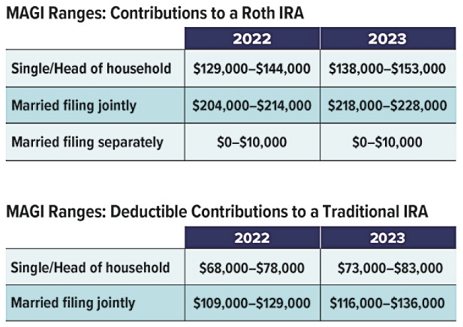Every year, the Internal Revenue Service announces cost-of-living adjustments that affect contribution limits for retirement plans and various tax deduction, exclusion, exemption, and threshold amounts. Here are a few of the key adjustments for 2023.
Estate, Gift, and Generation-Skipping Transfer Tax
- The annual gift tax exclusion (and annual generation-skipping transfer tax exclusion) for 2023 is $17,000, up from $16,000 in 2022.
- The gift and estate tax basic exclusion amount (and generation-skipping transfer tax exemption) for 2023 is $12,920,000, up from $12,060,000 in 2022.
Standard Deduction
A taxpayer can generally choose to itemize certain deductions or claim a standard deduction on the federal income tax return. In 2023, the standard deduction is:
- $13,850 (up from $12,950 in 2022) for single filers or married individuals filing separate returns
- $27,700 (up from $25,900 in 2022) for married joint filers
- $20,800 (up from $19,400 in 2022) for heads of household
The additional standard deduction amount for the blind and those age 65 or older in 2023 is:
- $1,850 (up from $1,750 in 2022) for single filers and heads of household
- $1,500 (up from $1,400 in 2022) for all other filing statuses
Special rules apply for those who can be claimed as a dependent by another taxpayer.

IRAs
The combined annual limit on contributions to traditional and Roth IRAs is $6,500 in 2023 (up from $6,000 in 2022), with individuals age 50 or older able
to contribute an additional $1,000. The limit on contributions to a Roth IRA phases out for certain modified adjusted gross income (MAGI) ranges (see chart). For individuals who are active participants in an employer-sponsored retirement plan, the deduction for contributions to a traditional IRA also phases out for
certain MAGI ranges (see chart). The limit on nondeductible contributions to a traditional IRA is not subject to phaseout based on MAGI.
Employer-Sponsored Retirement Plans
- Employees who participate in 401(k), 403(b), and most 457 plans can defer up to $22,500 in compensation in 2023 (up from $20,500 in 2022); employees age 50 or older can defer up to an additional $7,500 in 2023 (up from $6,500 in 2022).
- Employees participating in a SIMPLE retirement plan can defer up to $15,500 in 2023 (up from $14,000 in 2022), and employees age 50 or older can defer up to an additional $3,500 in 2023 (up from $3,000 in 2022).
Kiddie Tax: Child’s Unearned Income
Under the kiddie tax, a child’s unearned income above $2,500 in 2023 (up from $2,300 in 2022) is taxed using the parents’ tax rates.







